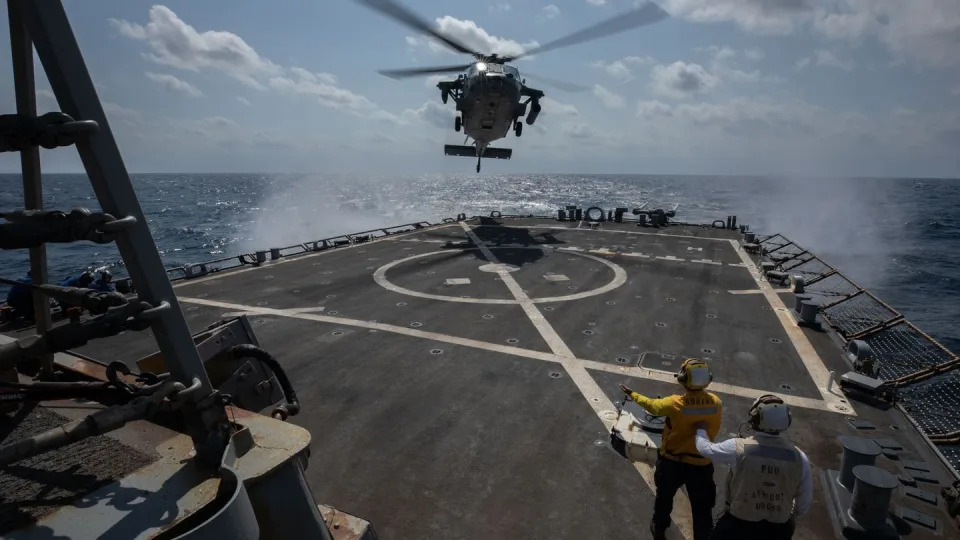Yemen's Houthis will introduce military "surprises" in their Red Sea operations, the Iran-aligned group's leader Abdul Malik al-Houthi said in a televised speech on Thursday.
"Our military operations will continue and advance and we have surprises that our enemies will not expect at all," al-Houthi said.
Houthi militants have repeatedly launched drones and missiles against international commercial shipping since mid-November, saying they are acting in solidarity with Palestinians against Israel's military actions in Gaza.
Their Red Sea attacks have disrupted global shipping and forced firms to re-route to longer and more expensive journeys around southern Africa and stoked fears that the Israel-Hamas war could spread to destabilise the wider Middle East.
The United States and Britain began striking Houthi targets in Yemen last month in retaliation for the attacks on Red Sea shipping.
February Red Sea recap: A busy month for Navy against Houthi attacks
The Navy endured a hectic month of engagements with Iran-backed Houthi militants in the Middle East, defending against a steady stream of nearly daily attacks, including what officials said was the first observed use of an underwater attack drone by the Yemen-based group.
As of Wednesday, U.S. forces destroyed, or tracked the firing, or the intent to launch in February of at least 23 anti-ship ballistic missiles, 61 anti-ship cruise missiles, 17 surface drones, three mobile land attack cruise missiles and 60 air drones that the Houthis launched or were prepared to fire, according to a tally of incidents announced by U.S. Central Command, as well as reporting by Military Times and The Associated Press.
American and allied forces at least twice during the past month — on Feb. 3 and Feb. 24 — led multinational coalition strikes against Houthi targets in Yemen as well.
U.S. forces also took out an underwater drone on February 17, an unmanned system which CENTCOM stated had not previously been employed by the Houthis since their aggression against commercial and military ships in the Red Sea and the Gulf of Aden began in October.
While the use of undersea drones is not in and of itself a game changer when it comes to naval warfare, it could represent a substantial step in Houthi capability, according to Bryan Clark, a retired submariner and senior fellow at the Hudson Institute think tank.
“There isn’t a good defense against them other than speed or maneuver, and cargo ships can’t use either in the Red Sea,” Clark told Military Times.
Among the other harrowing episodes to emerge in the last few weeks, the Houthis launched two anti-ship ballistic missiles at the M/V Rubymar on Feb. 18.
CENTCOM said the attack on the Belize-flagged, U.K.-owned bulk carrier caused damage that led to an 18-mile oil slick, and warned that spillover of more than 41,000 tons of fertilizer the vessel was carrying could lead to “environmental disaster.”
In light of the nearly uninterrupted number of attacks this past month from the Houthis, some lawmakers on Capitol Hill remain skeptical of President Joe Biden’s strategy to deter the assaults and questioned whether the U.S. has the authority to perform its ongoing operation against the recently-designated terrorist group without congressional authorization.

“If we believe this is a just military action, and I do, then we should authorize it,” Sen. Chris Murphy, D-Conn. said during a hearing Tuesday.
“But we also need to acknowledge there is a real risk of escalation in the Red Sea, especially since Iran is unquestionably aiding the actions of the Houthis,” Murphy said. “Thus an authorization is important to legalize the existing operations but also guard against an unauthorized mission creep.”
A top administration official for the region countered during the hearing that actions approved by the president are within the scope of his constitutional authorities as commander-in-chief.
Meanwhile, the Department of the Treasury this week, in partnership with the United Kingdom, announced sanctions against a deputy commander of Iran’s Islamic Revolutionary Guard Corps’ Quds Force and a Houthi militant member.
U.S., Britain unveil new Houthi-targeted sanctions
The United States and Britain on Tuesday unveiled sanctions targeting the Iran-backed Houthi militia over its attacks on their military ships as well as commercial vessels transiting the Red Sea and the Gulf of Aden.
The Houthis have launched more than 45 attacks on ships off Yemen's coast since Nov. 19, prompting Washington and London to retaliate with large- and small-scale strikes into Yemen of their own.
The Biden administration has described the ally strikes as an effort to degrade the Houthis' military ability and deter it from further attacks, with the sanctions announced Tuesday as a method to cut off its funding of them.
Together, the two countries sanctioned Mohammad Reza Fallahzadeh, deputy commander of Iran's Islamic Revolutionary Guard Corps Quds Force, whom the State Department described as a Houthi-affiliated operative "who has supported the Houthis' aggressive actions."
The U.S. Treasury said it also sanctioned the Hong Kong-based Cap Tees Shipping Co. and its Artura vessel, which has transported Iranian commodities for Houthi financier Sa'id al-Jamal, the head of a network of front companies and shipping vessels whom the United States designated in June 2021 for generating tens of millions in the sale of Iranian petroleum through sanctions evasion.
The Biden administration said Tuesday that Artura received Iranian goods via a ship-to-ship transfer that it then handed off to the MEHLE tanker, which was hit with U.S. sanctions on Jan. 12 for its connection to al-Jamal.
Britain on Tuesday announced that it had also sanctioned al-Jamal.
"The attacks by the Iran-backed Houthis are unacceptable, illegal and a threat to innocent lives and freedom of navigation," Foreign Secretary David Cameron said in a statement.
"As I have made clear to the Iranian Foreign Minister, the regime bears responsibility for these attacks due to the extensive military support it has provided to the Houthis."
Separately, Britain on Tuesday sanctioned IRGC Quds Force Unit 190 for transferring and smuggling weapons to militias allied with Iran, IRGC Quds Force Unit 6000 as it is in charge of operations in the Arabian Peninsula and has personnel aiding the Houthis in Yemen and IRGC Quds Force Unit 340, which is in charge of research and development and offers training and technical support to Iran-backed groups.
Ali Hussein Badr Al Din Al-Houthi, the Houthi's undersecretary of the Interior and commander of security, was also blacklisted by London.
Washington on its own Tuesday hit Houthi member Ibrahim al-Nashiri.
"As the Houthis persistently threaten the security of peaceful international commerce, the United States and the United Kingdom will continue to disrupt the funding streams that enable these destabilizing activities," Under Secretary of the Treasury for Terrorism and Financial Intelligence Brian Nelson said in a statement.
Amid Israel's war against Hamas, another Iran proxy militia, in Gaza, the Houthis have vowed to erect a naval blockade of the all-important trade route that passes Yemen in solidarity with Palestinians.
At least 18 shipping companies have rerouted their vessels around horn of Africa to avoid the violence, which adds cost and time to the delivery of goods. Between 10% and 15% of global trade transit through the Red Sea.
The U.S. sanctions on Tuesday follow the Houthis being redesignated in mid-January as a terrorist organization.


